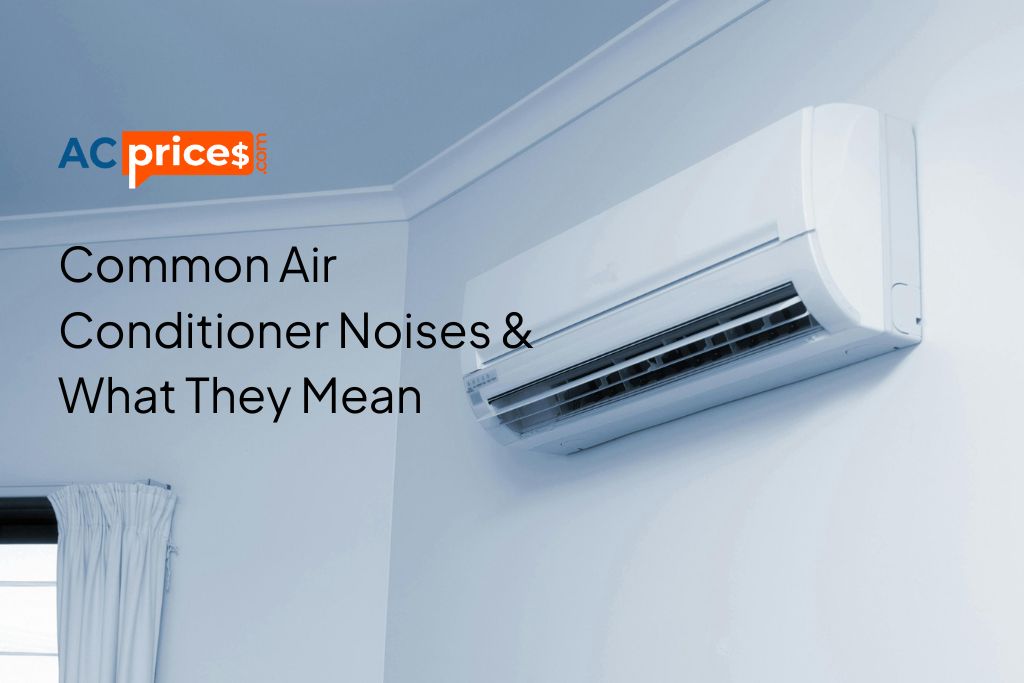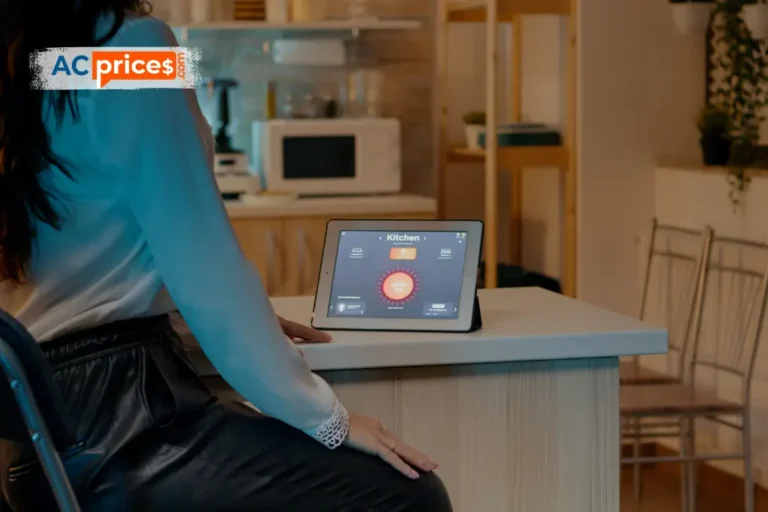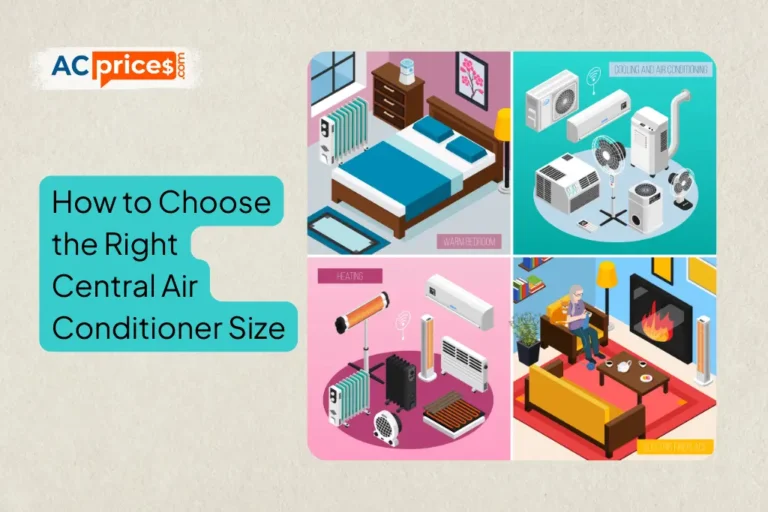Common Air Conditioner Noises & What They Mean

Common Air Conditioner Noises & What They Mean
Modern central air conditioners and heat pumps usually run between 40–60 decibels — about as quiet as a normal conversation. That’s completely normal. You may also hear a soft click when your system starts or shuts down, and that’s fine too.
But if your AC suddenly starts banging, clanking, or screeching, it’s usually a sign of a problem. Ignoring it can make the issue worse and costlier to fix later.
Also, keep in mind that many Canadian cities have residential noise limits. For example, in Toronto, outdoor AC units can’t be louder than 50 dB during the day and 45 dB at night.
In this guide, we’ll walk you through the most common air conditioner noises, what causes them, and how to fix them safely.
1. Banging or Clanking Sounds
What it sounds like: A loud banging or hammering sound, like something is slamming inside the unit—especially when it starts or stops. Sometimes the whole unit shakes.
Possible causes:
- Loose or broken part inside the compressor
- Fan blade or blower wheel is loose
- Unbalanced blower fan hitting other parts
- Damaged compressor (broken rod or spring inside)
- Faulty fan motor struggling to start
- Normal wear from switching between heavy summer use and winter shutdown
What to do:
- Turn off the AC right away.
- Check the outdoor unit for loose screws, panels, or a fan blade hitting something. Tighten if you see anything obvious.
- If the sound continues or you see nothing wrong, call a certified technician.
- If the compressor is internally damaged, it might need replacement (can cost around $1,350–$2,300). If your unit is old, replacing the whole system may be more cost-effective.
2. Hissing or Whistling Sounds
What it sounds like: A steady hiss (like air leaking from a tire) or a sharp, high-pitched whistle.
Possible causes:
- Refrigerant leak in the coil or line
- High pressure inside the compressor
- Leaky AC valve
- Air leaking from ducts
- Dirty or clogged air filter restricting airflow
- Undersized or loose air filter getting pulled into the return grille
What to do:
- If the hiss becomes a loud screech, turn off the system immediately (pressure may be dangerously high).
- Check and replace dirty or wrongly sized air filters.
- Inspect visible ductwork for gaps and seal with foil tape or mastic.
- Do not handle refrigerant lines yourself — only licensed HVAC technicians can do that in Canada.
- Call a technician to locate the leak, repair it, and recharge the refrigerant safely.
3. Buzzing or Vibrating Sounds
What it sounds like: A loud electric hum or a buzzing like a swarm of bees. You might feel vibrations through the floor.
Possible causes:
- Loose panel or fan blade
- Debris caught in the outdoor fan
- Failing contactor relay
- Weak or failing capacitor
- Compressor or electrical issue
- Frozen evaporator coil
- Window or portable AC unit not fitted properly
What to do:
- Turn off the power from the thermostat and breaker.
- Clear out any debris from the outdoor unit.
- Tighten loose screws on the condenser panels.
- Gently check if the fan blade is loose (if yes, call a technician).
- If you can’t find the cause, call a technician to test and replace faulty parts like the capacitor (usually $150–$400).
4. Clicking Sounds at Startup or Shutdown
What it sounds like: A single click or a rapid ticking when the system starts or stops.
Possible causes:
- Normal click from thermostat or relay
- Faulty contactor rapidly clicking
- Bad control board or relay
- Malfunctioning thermostat (low battery)
- Weak capacitor or stuck compressor
- Metal ducts expanding or contracting
What to do:
- If clicking keeps happening or the system won’t start, note where the sound is coming from.
- Replace thermostat batteries.
- Don’t keep resetting the breaker or thermostat repeatedly.
- Call a technician to check the contactor, capacitor, thermostat, or control board.
5. Rattling Sounds
What it sounds like: Like loose screws or marbles shaking in a tin can. Usually louder when the AC starts or stops.
Possible causes:
- Loose screws, panels, or fan blade
- Debris like pebbles or twigs inside the condenser
- Loose or damaged blower fan
- Vibrating refrigerant lines
- Loose vent covers or rattling ducts
What to do:
- Turn off the power at the thermostat and breaker.
- Tighten loose screws on the outdoor unit.
- Remove the top grille and clear debris.
- Inspect fan blades and indoor blower for looseness or damage.
- If the noise continues, call a technician for a full inspection.
6. Squealing or Screeching Sounds

What it sounds like: A high-pitched squeal or metal-on-metal scraping. It may happen when your AC first starts up or continue while running.
Possible causes:
- Worn or loose blower belt (common in older systems)
- Worn-out motor bearings in the fan or blower
- Lack of lubrication on moving parts
- Excess pressure inside the compressor triggering a safety valve
- Overcharged refrigerant or a failing compressor valve building up pressure
What to do:
- If the screech is loud and coming from the outdoor unit, turn off the system immediately and call a technician.
- A technician will inspect the indoor blower motor, outdoor fan, and compressor to find the source.
- If it’s the blower motor, they may lubricate it (if it has oil ports) or replace worn bearings.
7. Gurgling or Bubbling Sounds
What it sounds like: Like water trickling or bubbling through a pipe—similar to a coffee maker or backed-up drain.
Possible causes:
- Refrigerant equalizing after shutdown (short, harmless noise)
- Clogged condensate drain line creating air bubbles or water backup
- Refrigerant leaking through a crack or pinhole
- Air trapped in refrigerant lines after recent service
- Minor gurgle from the expansion valve
- Internal drainage system running in portable/window units
What to do:
- Locate the condensate drain (usually a white PVC pipe near your indoor unit).
- Turn off the AC. Open the drain’s clean-out cap and scrub it with a wire brush.
- Pour a mix of vinegar and water down the drain to break up buildup.
- Use a wet/dry vacuum on the outdoor end to clear any clogs.
- Flush clean water through the line to confirm it drains.
- If gurgling continues or cooling is weak, call a technician to check for refrigerant leaks and recharge the system if needed.
8. Humming Sounds
What it sounds like: A low hum is normal, but if it gets louder or changes, something may be failing.
Possible causes:
- Normal sound of fan motor or compressor running
- Fan or blower motor running dry (needs lubrication)
- Bent coil fins or loose parts touching moving components
- Aging contactor or transformer humming from wear
- Bad capacitor or stuck fan motor (if humming but not running)
- Misaligned metal parts vibrating or rubbing
What to do:
- If the hum is new or louder than usual, check it out.
- If the outdoor unit hums but the fan isn’t spinning, it might be a bad capacitor or stuck motor—call a technician.
- For indoor humming, inspect if the blower motor is running smoothly.
- Check for any sheet metal or conduit touching the unit and causing vibration; add weather stripping or foam padding to stop contact.
- During your next maintenance visit, ask your technician to check and lubricate motor bearings (older motors often have oil ports).
9. Thumping or Clunking Sounds
What it sounds like: Like a soft hammer hit or a shoe tumbling inside a dryer. It may happen once when the unit starts or stops, or continue in a steady rhythm.
Possible causes:
- Unbalanced outdoor fan blade
- Dirty or bent indoor blower wheel
- Loose motor mounts
- Broken compressor mounting spring
- Sticks, ice, or other debris stuck inside the unit
- Metal ducts popping from pressure changes
What to do:
- Determine if the sound is from the indoor or outdoor unit.
- Turn off the system and shut off power at the breaker.
- Outdoor: Spin the fan blade by hand. If it wobbles or scrapes, tighten or carefully adjust it. Remove any debris.
- Indoor: Remove the furnace panel and check the blower wheel for wobble, dirt buildup, or missing blades.
- If anything looks loose, stop and call a technician—it may need realignment or replacement.
Preventive Maintenance: How to Keep Your AC Quiet
The easiest way to stop strange AC noises is to prevent them from starting. Here’s how:
- Book annual maintenance. Spring is ideal in most parts of Canada. A technician will clean, lubricate, and tighten everything before summer heat arrives.
- Clear space around the condenser. Keep at least 2 feet open. Trim plants, remove leaves, and keep debris out.
- Replace air filters regularly. At least every 3 months—or more often with pets or allergies. Dirty filters cause airflow problems that create noise.
- Listen and act early. If you hear a new rattle, buzz, or squeal, don’t wait. Early repairs are almost always cheaper.
- Protect your unit during winter. Shut off outdoor power and cover the condenser with a breathable cover to block debris and ice.
- Consider noise-reduction upgrades. Older models are just louder. Some support compressor sound blankets or other noise-dampening kits.
Keep Your AC Quiet and Reliable

Strange sounds are your AC’s way of telling you something’s wrong. Don’t ignore them—catching the issue early can prevent expensive repairs later.
💡 Tip: If your unit is old and naturally loud, you can look into newer, ultra-quiet central AC models designed for Canadian homes.
FAQs
Why does my AC make noise when turning on or off?
A soft click or whoosh is normal. But loud bangs, clunks, or repeated clicking may signal loose parts, a bad relay, or a compressor problem. If it keeps happening, call a technician.
Can I fix AC noises myself?
You can handle basics like cleaning debris, tightening screws, replacing filters, or clearing the drain line. Leave refrigerant leaks, electrical repairs, or internal part issues to licensed HVAC pros.
How much does it cost to fix a noisy AC in Canada?
Minor repairs (capacitor or contactor) are around $150–$400. Fan motor repairs may run $300–$700. Replacing a compressor can cost $1,000 or more, depending on parts, labour, and location.
Is some AC noise normal?
Yes — a low hum or airflow noise is expected. But loud banging, screeching, buzzing, or rattling usually means something’s wrong and needs maintenance or repair.



